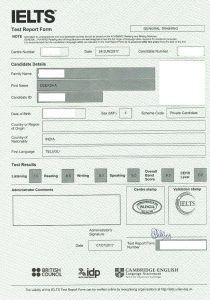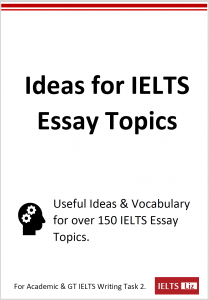My Tips for IELTS Overall 8.5
This page gives you my tips for how I got IELTS band score 8.5 overall in 3 steps. And also my tips for getting band 8 in IELTS writing and band score 9 in IELTS speaking.
by Deeksha
My IELTS Test Results
24th June; United States; First Attempt. I just received my IELTS score:
- Listening – 7.5
- Reading – 8.5
- Writing – 8.0
- Speaking – 9.0
- Overall – 8.5
I barely had 5 days to prepare. 70% of my preparation included watching the videos on your blog, answering your sample questions, and going through your tips! For the rest 30%, I printed some of the full-fledged tests and
sample answer sheets from the Cambridge IELTS books and just practised using those.
For anyone of you who has a very little time to prepare, I hope that the process I followed can help you lay out a basic schedule.
My 3 Step Tips for IELTS Band Score 8.5
See my 3 steps:
Step -1 (Know the test)
– Go through the test format.
– Spend some time and understand the question patterns in each segment.
– Keep in mind the time limit for every segment.
– Do an initial sample test (download from IELTS official website) just to see where you stand.
Links:
- Test Information: FAQs about IELTS
- Useful Websites & Official Links: Useful Websites for IELTS
- 1 Free Authentic IELTS Practice Test: IELTS Practice Test
- Learn the band scores: IELTS Band Scores Explained
Step-2 (Prepare using Liz’s blog)
– Go through every one of the 4 segments (L, R, W, S) in this blog, one after the other. Links: Listening Tips, /Reading / Writing T1 / Writing T2 / Speaking
– In each segment, read every tip and watch every video.
– Make notes of the points that you would like to keep in mind.
– Try and answer every sample question that Liz has laid out there. She has specified at least one sample question for every possible pattern that could appear on the test.
– Look at the answers and compare with yours. Figure out what you got wrong and more importantly, “analyze why you got them wrong.” This helps you understand how you approached the question, and how you should have.
Step-3 (Practice)
– Download all the versions of Cambridge IELTS books (you can just google them out).
– From these books, print out the full-fledged tests and sample answer sheets.
– Take these tests using a clock and write your answers in the sample answer sheets.
– Grade your tests and find out your weak areas.
– Make notes of your analysis and try to keep it in mind during the following tests.
In addition, go through the comments in this blog and find out what the recent test takers said about their tests. Know about the tips that helped them, learn from their experiences and be prepared.
Writing Tips for Band Score 8
On my test:
- Write a letter to your friend who is going to stay in your apartment during the next month while you are away on vacation
- Tell your friend where to get the keys
- Tell your friend about the equipment in your apartment
- Tell your friend about some places to visit in the area
- Advancement of technology has obliterated libraries and hard copies of books. Do you agree or disagree?
– Apart from your writing skills and the topic at hand, it may help to do this section in a way that encompasses all the elements that the examiner is looking for. Liz’s writing section mentions specific guidelines for content organization, format, tone, logical reasoning, titles, signatures and many other tips. Go through them and try to follow all those tips as you write. In other words, you will have a shell prepared in your mind even before you know what the questions are. Click here: IELTS GT Letter Tips
– I didn’t have time to practice this section at all so I had a bit of an issue managing time on the test. If you have very little time to prepare for IELTS, make sure you squeeze in at least a few writing tests and see where you stand with the time limit.
Speaking Tips for Band Score 9
Go through Liz’s list of sample topics, sample answers (Liz’s Speaking Page), comments from recent test takers (Recent Topics) on this blog and questions from IELTS Cambridge speaking tests. Try to answer them. These should be more than enough to help you familiarize with the test pattern and to understand what to expect on the test. From the comments, I also found out that most of these questions are being repeated so make sure you go through them. Almost all the questions that my examiner (whose name was coincidentally Liz) asked me were also from the above lot.
As Liz mentioned, they expect you to be casual and test you only for your language and not for your knowledge on the topic at hand. Think about this segment like you just bumped into a fan who would like to know some of your opinions and experiences. Well, you don’t simply meet a fan every day, so this is your chance – talk her ear off! J Be casual, funny, and confident and you’ll do just fine.
Try to book your test in a test center that does not use hallway speakers to play the audio in the listening section. There is a definite distinction in terms of quality compared to headphones. There is always a possibility of noise and distraction. I didn’t know about this while booking my test and I certainly experienced the difference.
Thanks,
Deeksha.
Good Luck!
Liz – Thanks again for the effort you are putting in, to assist so many test-takers all over the world, each with their own questions and training needs. It must feel incredible to know that most of these people credit their success to you. Keep up the good work!
Deeksha.
Message from Liz
Deeksha, you’ve done exceedingly well. Congratulations!! I love your tips! They are logical and very helpful for all IELTS students. Tackling IELTS methodically is essential and Deeksha has really hit the nail on the head !!! 🙂








